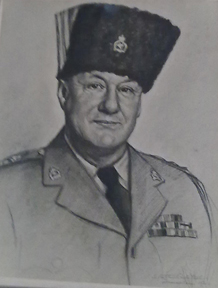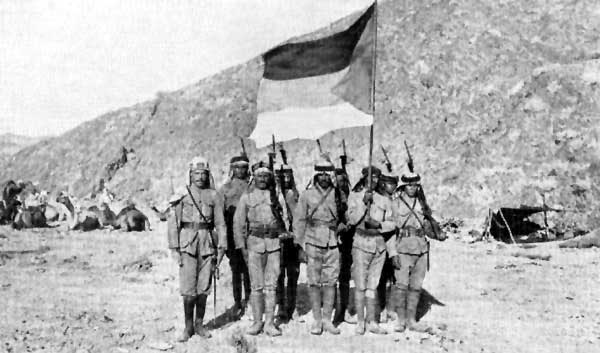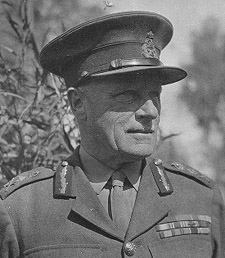|
Desert Force
The Desert Force (, ), also known as the Desert Patrol, was a paramilitary force of Transjordan. Its main task was to guard Jordanian borders with neighboring Iraq, Saudi Arabia and Syria as well as to provide protection for oil pipe lines of Iraqi Petroleum Company (IPC). It also participated in campaigns of Syria and Iraq during World War II. History The Desert Patrol was formed as a semi-independent part of the Arab Legion in February 1931 by Glubb Pasha to secure Transjordan's desert region of the country, effectively everything east of the cultivated area that formed Trans-Jordan’s western border with Palestine. The patrol replaced the Trans-Jordan Frontier Force in the desert. Initially it had 20 men in four trucks with Lewis and Vickers machine guns. Additional men were located in small forts throughout the region and relied on camels for mobility. Glubb recruited mainly Bedouins for the Patrol and helped establish strong links between the Bedouin and the monarchy that ... [...More Info...] [...Related Items...] OR: [Wikipedia] [Google] [Baidu] |
Paramilitary
A paramilitary is an organization whose structure, tactics, training, subculture, and (often) function are similar to those of a professional military, but is not part of a country's official or legitimate armed forces. Paramilitary units carry out duties that a country's military or police forces are unable or unwilling to handle. Other organizations may be considered paramilitaries by structure alone, despite being unarmed or lacking a combat role. Overview Though a paramilitary is, by definition, not a military, it is usually equivalent to a light infantry force in terms of strength, firepower, and organizational structure. Paramilitaries use "military" equipment (such as long guns and armored personnel carriers; usually military surplus resources), skills (such as battlefield medicine and bomb disposal), and tactics (such as urban warfare and close-quarters combat) that are compatible with their purpose, often combining them with skills from other relevant fields such a ... [...More Info...] [...Related Items...] OR: [Wikipedia] [Google] [Baidu] |
Glubb Pasha
Lieutenant-General Sir John Bagot Glubb, KCB, CMG, DSO, OBE, MC, KStJ, KPM (16 April 1897 – 17 March 1986), known as Glubb Pasha, was a British soldier, scholar, and author, who led and trained Transjordan's Arab Legion between 1939 and 1956 as its commanding general. During the First World War, he served in France. Glubb has been described as an "integral tool in the maintenance of British control." Life Born in Preston, Lancashire, and educated at Cheltenham College, Glubb gained a commission in the Royal Engineers in 1915. On the Western Front of World War I, he suffered a shattered jaw. In later years, this would lead to his Arab nickname of ''Abu Hunaik'', meaning "the one with the little jaw". He was then transferred to Iraq in 1920, which Britain had started governing under a League of Nations Mandate following war, and was posted to Ramadi in 1922 "to maintain a rickety floating bridge over the river uphrates carried on boats made of reeds daubed with bitumen" ... [...More Info...] [...Related Items...] OR: [Wikipedia] [Google] [Baidu] |
Arab Revolt
The Arab Revolt ( ar, الثورة العربية, ) or the Great Arab Revolt ( ar, الثورة العربية الكبرى, ) was a military uprising of Arab forces against the Ottoman Empire in the Middle Eastern theatre of World War I. On the basis of the McMahon–Hussein Correspondence, an agreement between the British government and Hussein bin Ali, Sharif of Mecca, the revolt was officially initiated at Mecca on June 10, 1916. The aim of the revolt was to create a single unified and independent Arab state stretching from Aleppo in Syria to Aden in Yemen, which the British had promised to recognize. The Sharifian Army led by Hussein and the Hashemites, with military backing from the British Egyptian Expeditionary Force, successfully fought and expelled the Ottoman military presence from much of the Hejaz and Transjordan. The rebellion eventually took Damascus and set up the Arab Kingdom of Syria, a short-lived monarchy led by Faisal, a son of Hussein. Following the Sy ... [...More Info...] [...Related Items...] OR: [Wikipedia] [Google] [Baidu] |
Gendarmerie
Wrong info! --> A gendarmerie () is a military force with law enforcement duties among the civilian population. The term ''gendarme'' () is derived from the medieval French expression ', which translates to " men-at-arms" (literally, "armed people"). In France and some Francophone nations, the gendarmerie is a branch of the armed forces that is responsible for internal security in parts of the territory (primarily in rural areas and small towns in the case of France), with additional duties as military police for the armed forces. It was introduced to several other Western European countries during the Napoleonic conquests. In the mid-twentieth century, a number of former French mandates and colonial possessions (such as Lebanon, Syria, the Ivory Coast and the Republic of the Congo) adopted a gendarmerie after independence. A similar concept exists in Eastern Europe in the form of Internal Troops, which are present in many countries of the former Soviet Union and its ... [...More Info...] [...Related Items...] OR: [Wikipedia] [Google] [Baidu] |
Bedouins
The Bedouin, Beduin, or Bedu (; , singular ) are nomadic Arabs, Arab tribes who have historically inhabited the desert regions in the Arabian Peninsula, North Africa, the Levant, and Mesopotamia. The Bedouin originated in the Syrian Desert and Arabian Desert but spread across the rest of the Arab world in Western Asia, West Asia and North Africa after the spread of Islam. The English word ''bedouin'' comes from the Arabic ''badawī'', which means "desert dweller", and is traditionally contrasted with ''ḥāḍir'', the term for Sedentism, sedentary people. Bedouin territory stretches from the vast deserts of North Africa to the rocky sands of the Middle East. They are traditionally divided into tribes, or clans (known in Arabic as ''ʿašāʾir''; or ''qabāʾil'' ), and historically share a common culture of herding camels and goats. The vast majority of Bedouins adhere to Islam, although there are some fewer numbers of Arab Christians, Christian Bedouins present in the Fe ... [...More Info...] [...Related Items...] OR: [Wikipedia] [Google] [Baidu] |
Vickers Machine Gun
The Vickers machine gun or Vickers gun is a Water cooling, water-cooled .303 British (7.7 mm) machine gun produced by Vickers Limited, originally for the British Army. The gun was operated by a three-man crew but typically required more men to move and operate it: one fired, one fed the ammunition, the others helped to carry the weapon, its ammunition, and spare parts. It was in service from before the First World War until the 1960s, with air-cooled versions of it on many Allies of World War I, Allied World War I fighter aircraft. The weapon had a reputation for great solidity and reliability. Ian V. Hogg, in ''Weapons & War Machines'', describes an action that took place in August 1916, during which the British 100th Company of the Machine Gun Corps fired their ten Vickers guns to deliver sustained fire for twelve hours. Using 100 barrels, they fired a million rounds without breakdowns. "It was this absolute foolproof reliability which endeared the Vickers to every Britis ... [...More Info...] [...Related Items...] OR: [Wikipedia] [Google] [Baidu] |
Trans-Jordan Frontier Force
The Trans-Jordan Frontier Force was formed on 1 April 1926, to replace the disbanded British Gendarmerie. It was a creation of the High Commissioners for Palestine and Transjordan, British High Commissioner for Palestine whose intention was that the Force should defend Emirate of Transjordan, Trans-Jordan's northern and southern borders. The TJFF was also an Imperial Service Troops, Imperial Service regiment whose Imperial Service soldiers agreed to serve wherever required and not just within the borders of their own colony, British protectorate, protectorate or, in the case of the Transjordan, League of Nations mandate, mandate. This was in contrast to the Arab Legion, which was seen more as an internal security militia, deriving from the troops of the Arab Revolt and closely associated with the Hashemite cause. The Abdullah I of Jordan, Amir Abdullah was an Colonel commandant, Honorary Colonel of the Trans-Jordan Frontier Force from its inception. However, the local commanders ... [...More Info...] [...Related Items...] OR: [Wikipedia] [Google] [Baidu] |
Arab Legion
The Arab Legion () was the police force, then regular army of the Emirate of Transjordan, a British protectorate, in the early part of the 20th century, and then of independent Jordan, with a final Arabization of its command taking place in 1956, when British senior officers were replaced by Jordanian ones. Creation In October 1920, after taking over the Transjordan region from the Ottoman Empire, Ottomans, the United Kingdom formed a unit of 150 men called the "Mobile Force", under the command of Captain Frederick Gerard Peake, to defend the territory against both internal and external threats. The Mobile Force was based in Zarqa. 80% of its men were drawn from the Chechens in Jordan, local Chechen community. It was quickly expanded to 1,000 men, recruiting Arabs who had served in the Ottoman Army (1861–1922), Ottoman Army. On 22 October 1923, the police were merged with the Reserve Mobile Force, still under Peake, who was now an employee of the Emirate of Transjordan. The ... [...More Info...] [...Related Items...] OR: [Wikipedia] [Google] [Baidu] |
Emirate Of Transjordan
The Emirate of Transjordan ( ar, إمارة شرق الأردن, Imārat Sharq al-Urdun, Emirate of East Jordan), officially known as the Amirate of Trans-Jordan, was a British protectorate established on 11 April 1921,Hashemite Monarchs of Jordan , "The Emirate of Transjordan was founded on April 11, 1921, and became the Hashemite Kingdom of Jordan upon formal independence from Britain in 1946" which remained as such until achieving formal independence in 1946. After the Ottoman defeat in World War I, the Transjordan region was administered within OETA East; a ... [...More Info...] [...Related Items...] OR: [Wikipedia] [Google] [Baidu] |
World War II
World War II or the Second World War, often abbreviated as WWII or WW2, was a world war that lasted from 1939 to 1945. It involved the vast majority of the world's countries—including all of the great powers—forming two opposing military alliances: the Allies and the Axis powers. World War II was a total war that directly involved more than 100 million personnel from more than 30 countries. The major participants in the war threw their entire economic, industrial, and scientific capabilities behind the war effort, blurring the distinction between civilian and military resources. Aircraft played a major role in the conflict, enabling the strategic bombing of population centres and deploying the only two nuclear weapons ever used in war. World War II was by far the deadliest conflict in human history; it resulted in 70 to 85 million fatalities, mostly among civilians. Tens of millions died due to genocides (including the Holocaust), starvation, ma ... [...More Info...] [...Related Items...] OR: [Wikipedia] [Google] [Baidu] |
Iraqforce
Iraqforce was a British and Commonwealth formation that came together in the Kingdom of Iraq. The formation fought in the Middle East during World War II. Background During World War I, the British Army defeated the Ottoman Army in the Middle East during the Mesopotamian Campaign. Subsequently, the League of Nations designated Mesopotamia as the British Mandate of Mesopotamia. From 1920 to the early 1930s, RAF Iraq Command was created as an inter-service command in charge of all British forces in the mandate-controlled Kingdom of Iraq and was commanded by an RAF officer normally of Air Vice-Marshal rank. In 1932, the British mandate in Iraq ended and according to the Anglo-Iraqi Treaty of 1930, the United Kingdom was permitted to maintain troops in Iraq. In 1933 or 1934, RAF Iraq Command was renamed the British Forces in Iraq. By the late 1930s, these forces were restricted to two Royal Air Force stations, RAF Shaibah near Basra and RAF Habbaniya west of Baghdad. On 1 April 19 ... [...More Info...] [...Related Items...] OR: [Wikipedia] [Google] [Baidu] |




.jpg)




